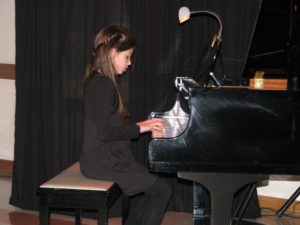written by Allison Boyd, Metro Music Makers Founder and President
 In my 25-plus years of teaching, I have noticed that students who memorize their music for performances are more likely to have successful performance experiences than students who don’t. This doesn’t mean that the students who memorize will always have a “perfect” performance, although some may come close. It does mean that students who prepare and internalize their music through memorization develop a familiarity with the music that cannot be achieved otherwise.
In my 25-plus years of teaching, I have noticed that students who memorize their music for performances are more likely to have successful performance experiences than students who don’t. This doesn’t mean that the students who memorize will always have a “perfect” performance, although some may come close. It does mean that students who prepare and internalize their music through memorization develop a familiarity with the music that cannot be achieved otherwise.
Memorization works hand-in-hand with the active learning of an instrument for the student to achieve well-rounded musicianship. When beginning students express hesitancy about memorizing, I remind them that even the contestants on American Idol or their favorite artists like Taylor Swift and Coldplay always perform from memory. The comparison to a student’s favorite artist can be very motivating!
1. Learn the music. Take time with your instructor to analyze the form of the music. You may even color-code patterns and repeating sections. Recognizing patterns can greatly aid the memorization process. Practice slowly and consistently with the music as you are learning it.
2. Stick with the fingering. It’s so important to use the same fingering each time you practice your music, whether it is notated or not. If you have music that does not designate good fingerings, ask your instructor to help you notate the fingerings in the music. Your fingers build muscle memory when you practice. A lack of consistent fingering results in a lack of muscle memory, and this can greatly hinder the mental memorization process.
3. Memorize one section at a time. Don’t overwhelm yourself with the thought of memorizing an entire piece. Set memorization goals of a “section” at a time. A section may be a phrase, or a pattern, or a set number of measures. Once you memorize one section, then move on to memorize the next section. Once both sections are memorized, try playing them from memory back-to-back. You may skip around the piece using this technique as you initially work on memory. Ultimately, you’ll have the entire piece memorized.
4. Practice without the music in front of you. Many students want to keep the music in front of them as they look down to practice from memory. However, this kind of practice can become a crutch, especially when the music isn’t on the stand when you’re in front of an audience. Turn the music over so that you cannot see the notes when you practice from memory. Eventually you will want to practice without the music on the stand, just as it would be in a performance.
5. Know your “safety sections.” “Safety sections” are the sections in the music that you can easily jump to should a memory slip occur. Jumping to a safety section will allow you to gracefully cover up your mistake and continue to the end of the piece. During lessons, I instruct students to fake a memory slip in order to purposely practice jumping to the safety section. Every professional musician that I know has experienced memory slips. It just happens. Preparing your safety sections is necessary.
6. Set a memorization deadline. Performance events can be compared to taking an exam—you can’t cram for it and expect a successful experience. Mental and muscle memory take consistent practice and repetition. As a general rule, I require students to have their performance music memorized at least two weeks prior to a performance. Depending on the event, the learning style of a student and the difficulty of the music, I may require an earlier memorization deadline. Setting a memorization deadline allows time for the student to practice performing from memory in front of others prior to the main event.
7. Perform for a small audience from memory. Prior to a performance event, gather a small group of family and friends to listen to you perform from memory. They must be in the same room as you are! It doesn’t count if the family is at the dinner table in a separate room. Playing from memory while others are intent on watching you is a skill to be practiced!
The memorization of music is an essential part of overall musicianship, and it is a skill that can be developed through preparation and practice. Remember, the more you do it, the easier it will get!
Allison J Boyd
Private Piano Instructor
Music Therapist, Board-Certified
President, Metro Music Makers, Inc.
